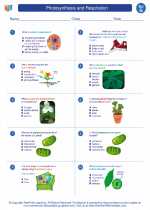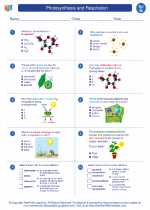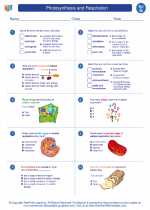Photosynthesis and Respiration -> liquid
Liquid
In science, a liquid is one of the four fundamental states of matter. It is characterized by its ability to flow and take on the shape of its container. Liquids have a definite volume, but they do not have a definite shape.
Characteristics of Liquids
- Fluidity: Liquids can flow and take the shape of their container.
- Definite volume: Liquids have a fixed volume that does not change, regardless of the shape of the container.
- No definite shape: Liquids take the shape of the container they are in.
- Relative incompressibility: Liquids are difficult to compress and maintain a nearly constant volume under pressure.
- Surface tension: Liquids have a tendency to minimize their surface area, resulting in surface tension, which allows some insects to walk on water.
Examples of Liquids
Some common examples of liquids include water, milk, juice, soda, vinegar, and oil.
States of Matter
Liquids are one of the three primary states of matter, along with solids and gases. They are characterized by their ability to flow and take the shape of their container, unlike solids which have a fixed shape, and gases which expand to fill their container.
Study Guide
Here are some key points to remember about liquids:
- What are the characteristics of liquids?
- Fluidity
- Definite volume
- No definite shape
- Relative incompressibility
- Surface tension
- Provide examples of liquids.
- How do liquids compare to solids and gases?
Liquids flow and take the shape of their container, unlike solids which have a fixed shape, and gases which expand to fill their container.
Understanding the properties and behavior of liquids is essential in various scientific fields, including chemistry, physics, and biology.
[Liquid] Related Worksheets and Study Guides:
.◂Science Worksheets and Study Guides Seventh Grade. Photosynthesis and Respiration

 Worksheet/Answer key
Worksheet/Answer key
 Worksheet/Answer key
Worksheet/Answer key
 Vocabulary/Answer key
Vocabulary/Answer key
 Vocabulary/Answer key
Vocabulary/Answer key
 Vocabulary/Answer key
Vocabulary/Answer key
